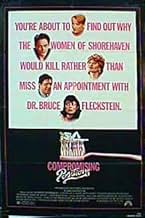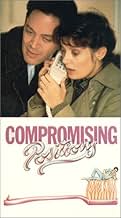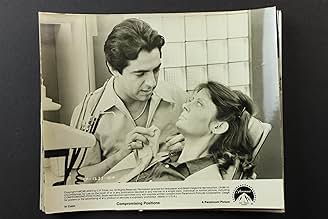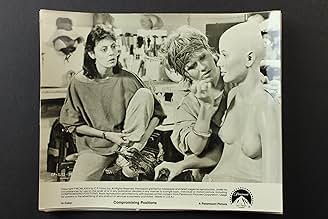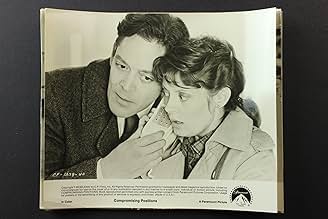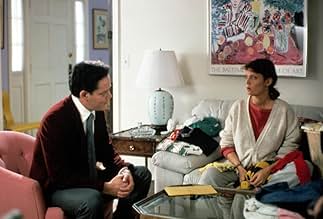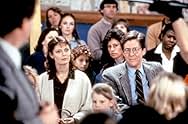IMDb RATING
5.9/10
1.2K
YOUR RATING
An ex-newspaper woman who is now a suburban housewife can't resist getting involved in an investigation of the murder of a philandering dentist who had been having affairs with several of he... Read allAn ex-newspaper woman who is now a suburban housewife can't resist getting involved in an investigation of the murder of a philandering dentist who had been having affairs with several of her neighbors.An ex-newspaper woman who is now a suburban housewife can't resist getting involved in an investigation of the murder of a philandering dentist who had been having affairs with several of her neighbors.
Anne DeSalvo
- Phyllis Fleckstein
- (as Anne De Salvo)
Featured reviews
This is one of the biggest surprises to come out of the 80's. I could watch it over and over....Susan Sarandon is great (a strong and dynamic woman trapped in a dull marriage to a total jerk) - Edward Herrman plays the perfect total jerk. Judith Singer's relationship with the lieutenant played by the wonderful late Raul Julia is beautifully played out. The funniest of all is Judith Ivey with her unbelievable delivery (especially the line about the cole slaw). The tongue in cheek parody of an annoyingly incestuous suburban community is handled with subtle humor and total class. I really recommend this movie!
BTW, Compromising Positions is based on the novel by Susan Isaacs; if you love the movie you will adore the book as well.
BTW, Compromising Positions is based on the novel by Susan Isaacs; if you love the movie you will adore the book as well.
. . .but anyone else should like it,too. I saw it for the first time in the theater when I was 19. It was the first movie I went to alone because none of my friends wanted to see a "girl's movie". It is that, but it's a wonderful one of those. Since then I've seen it a dozen times and it always makes me laugh.
Susan is wonderful as always and Raul Julia is solid, but Judith Ivy steals every scene she's in. Some of the other characters are excentric to distraction, but over all it's very entertaining. It's the kind of comedy that's amusing even if it's not laugh-out-loud funny all the time. Now it's a little dated, but still really fun to watch.
Susan is wonderful as always and Raul Julia is solid, but Judith Ivy steals every scene she's in. Some of the other characters are excentric to distraction, but over all it's very entertaining. It's the kind of comedy that's amusing even if it's not laugh-out-loud funny all the time. Now it's a little dated, but still really fun to watch.
I recently rediscovered this movie in a box of old tapes. Unable to remember much about it, I watched it twice more. This made me appreciate the film more, but also reminded me of its flaws and limitations.
A sleazy, tacky, womanizing dentist (Joe Mantegna) serving an upscale New York suburb is murdered in his office one night. A new patient (Susan Sarandon) is drawn into an amateur investigation of the case, rekindling her own spirits and interests. She is the unassuming, dowdy housewife of an egotistical, stressed-out, button-down corporate law firm attorney (Edward Herrmann). Years ago, she was a reporter.
Many in her circle of female friends and neighbors are either gossiping about or had affairs with the dentist (he would say "there is only one way to find out if you are a natural blonde"; when first going out with a new woman, he would take her to a Chinese restaurant by a motel; afterward, he would not even spring for the meal, heading directly to the motel "so they could spend the most time together"). A married woman is desperate to recover the dentist's nude photos of her in lewd poses, which he also took of others, including his nurse.
The suspects include these women, along with Sarandon's tight-lipped neighbor; the dentist's short, nasal, hard-edged wife with the "Nazi dog" (Sarandon's term, after it practically pushes her up and over the back of an armchair trying to take a bite out of her groin); the dentist's chubby, bald, weak-willed brother-in-law, who is a printer and may have worked with him and the mob to produce pornography that "would make a child molester happy"; and the brother's tall, blonde wife.
As she investigates, Sarandon takes abuse from her self-centered, work-absorbed husband and from a sulky, tall-dark-silent-type police detective (Raul Julia). They complain that she is imposing on them, is in over her head, is getting in the way, and is endangering herself (at one point, her kitchen is vandalized). She perseveres, wins the cop's heart and finally her husband's grudging respect, hatches a plan that causes her to stumble into the solution of the murder, and triumphantly presents her free-lance story to a previously skeptical, patronizing editor for publication. As the movie fades to credits, she is working on another.
Sarandon is immensely likable as the down-to-earth, wide-eyed, spunky heroine. Her interplay with her female friends and neighbors -- who range from prim-acting and reserved to bawdy and flamboyant -- is fun. In particular, these characters are drawn with wit, intelligence and attention to detail. The acting is uniformly good. There are nice touches of black humor (e.g., the killer is provoked by the dentist's extra insensitivity in including a certain subject along with the featured woman in one of his photos). Mantegna gets almost no screen time, but we learn enough about his crude tactics through other characters that it might even have been heavy-handed to see more of him in action.
Yet, the film is unsatisfying. Although there is some smart, spicy detail to the dialogue and characters, and Sarandon's good-natured perseverance is endearing, the movie does not amount to much in the end. It is itself like light-weight, gossipy chatter with comfortable, quirky friends about a scandal. It may be a pleasant ride, but it does not feel as if it has much meaning. (The closest the film comes is Sarandon's talk with her brash, philandering friend about marriage and attraction to other men, but it is short and surface-level. Even War of the Roses and Heartburn make more of an impression.) And even the ride becomes a little slow and repetitive after the quirky characters are introduced and as the film wears on, including some bumpy parts (the mob/pornography angle comes off as a vague, muddled, off-putting contrivance).
The film does a good job of creating characters to serve its humorous side. But it does a poor job of creating characters who represent the film's serious side and/or of weaving them into the comedy.
Herrmann's part is well-written and well-acted -- for another movie. His strident rants against Sarandon for not appreciating how hard he works to provide for her and for not dropping the case and staying at home (and her screaming tirade back at him at one point about having to put up with his late-hour, uninteresting work and needing more in her life) are jarringly out-of-place with the comedy and overall tone of this film.
Julia's bland, stiff, tight-lipped, undeveloped character is a huge disappointment. The film makes no attempt to credibly establish him as a cop; he does not make one smart, skillful move in the entire film. We know absolutely nothing about him, except his clipped answer to Sarandon late in the movie that he is divorced with two teen boys. With little more to do for most of the film than deliver tedious, by-the-book warnings, over and over again, that she should not interfere, he is reduced to a Latin Jack Webb. Then he suddenly, awkwardly, without explanation, confesses his love for her, thereafter appreciating her meddling in the case. This abrupt, poorly developed scene comes out of nowhere and goes nowhere, apparently depending heavily on the on-screen "chemistry" between the two actors rather than on intelligible, credible story development. I am all for honoring Julia as an actor, but to mean anything it should be for something meaningful in the material or his performance, not simply for being someone's idea of a "hunk."
It is easy to agree with other reviews that this film has the makings of a fun, old favorite, perfect for revisiting for a pleasant, familiar diversion on a bad-weather weekend afternoon. But to leave a review there ignores nagging problems that get in the way of fuller enjoyment of the movie, on first or repeat viewing. As its relative obscurity suggests, the film is likable but too thin and uneven to really satisfy.
A sleazy, tacky, womanizing dentist (Joe Mantegna) serving an upscale New York suburb is murdered in his office one night. A new patient (Susan Sarandon) is drawn into an amateur investigation of the case, rekindling her own spirits and interests. She is the unassuming, dowdy housewife of an egotistical, stressed-out, button-down corporate law firm attorney (Edward Herrmann). Years ago, she was a reporter.
Many in her circle of female friends and neighbors are either gossiping about or had affairs with the dentist (he would say "there is only one way to find out if you are a natural blonde"; when first going out with a new woman, he would take her to a Chinese restaurant by a motel; afterward, he would not even spring for the meal, heading directly to the motel "so they could spend the most time together"). A married woman is desperate to recover the dentist's nude photos of her in lewd poses, which he also took of others, including his nurse.
The suspects include these women, along with Sarandon's tight-lipped neighbor; the dentist's short, nasal, hard-edged wife with the "Nazi dog" (Sarandon's term, after it practically pushes her up and over the back of an armchair trying to take a bite out of her groin); the dentist's chubby, bald, weak-willed brother-in-law, who is a printer and may have worked with him and the mob to produce pornography that "would make a child molester happy"; and the brother's tall, blonde wife.
As she investigates, Sarandon takes abuse from her self-centered, work-absorbed husband and from a sulky, tall-dark-silent-type police detective (Raul Julia). They complain that she is imposing on them, is in over her head, is getting in the way, and is endangering herself (at one point, her kitchen is vandalized). She perseveres, wins the cop's heart and finally her husband's grudging respect, hatches a plan that causes her to stumble into the solution of the murder, and triumphantly presents her free-lance story to a previously skeptical, patronizing editor for publication. As the movie fades to credits, she is working on another.
Sarandon is immensely likable as the down-to-earth, wide-eyed, spunky heroine. Her interplay with her female friends and neighbors -- who range from prim-acting and reserved to bawdy and flamboyant -- is fun. In particular, these characters are drawn with wit, intelligence and attention to detail. The acting is uniformly good. There are nice touches of black humor (e.g., the killer is provoked by the dentist's extra insensitivity in including a certain subject along with the featured woman in one of his photos). Mantegna gets almost no screen time, but we learn enough about his crude tactics through other characters that it might even have been heavy-handed to see more of him in action.
Yet, the film is unsatisfying. Although there is some smart, spicy detail to the dialogue and characters, and Sarandon's good-natured perseverance is endearing, the movie does not amount to much in the end. It is itself like light-weight, gossipy chatter with comfortable, quirky friends about a scandal. It may be a pleasant ride, but it does not feel as if it has much meaning. (The closest the film comes is Sarandon's talk with her brash, philandering friend about marriage and attraction to other men, but it is short and surface-level. Even War of the Roses and Heartburn make more of an impression.) And even the ride becomes a little slow and repetitive after the quirky characters are introduced and as the film wears on, including some bumpy parts (the mob/pornography angle comes off as a vague, muddled, off-putting contrivance).
The film does a good job of creating characters to serve its humorous side. But it does a poor job of creating characters who represent the film's serious side and/or of weaving them into the comedy.
Herrmann's part is well-written and well-acted -- for another movie. His strident rants against Sarandon for not appreciating how hard he works to provide for her and for not dropping the case and staying at home (and her screaming tirade back at him at one point about having to put up with his late-hour, uninteresting work and needing more in her life) are jarringly out-of-place with the comedy and overall tone of this film.
Julia's bland, stiff, tight-lipped, undeveloped character is a huge disappointment. The film makes no attempt to credibly establish him as a cop; he does not make one smart, skillful move in the entire film. We know absolutely nothing about him, except his clipped answer to Sarandon late in the movie that he is divorced with two teen boys. With little more to do for most of the film than deliver tedious, by-the-book warnings, over and over again, that she should not interfere, he is reduced to a Latin Jack Webb. Then he suddenly, awkwardly, without explanation, confesses his love for her, thereafter appreciating her meddling in the case. This abrupt, poorly developed scene comes out of nowhere and goes nowhere, apparently depending heavily on the on-screen "chemistry" between the two actors rather than on intelligible, credible story development. I am all for honoring Julia as an actor, but to mean anything it should be for something meaningful in the material or his performance, not simply for being someone's idea of a "hunk."
It is easy to agree with other reviews that this film has the makings of a fun, old favorite, perfect for revisiting for a pleasant, familiar diversion on a bad-weather weekend afternoon. But to leave a review there ignores nagging problems that get in the way of fuller enjoyment of the movie, on first or repeat viewing. As its relative obscurity suggests, the film is likable but too thin and uneven to really satisfy.
Hard to believe it from this black comedy, but director Frank Perry used to excel with stories about headstrong women shaking off the chains from their men and finding answers on their own. Therefore, it's rather sad to see Susan Sarandon so open-mouthed and hesitant here, kowtowing to a perfectly dreadful Edward Herrmann in the opening scenes of "Compromising Positions". After her lascivious dentist is murdered, Sarandon goes against hubby's wishes and helps detective Raul Julia solve the case. It's too late; too much compromising has been done on Perry's part and whatever visual interest there is early on has sputtered. Is there nothing more depressing than a deadening plot taking place in dullsville surroundings? Perry used to stage high-wire acts in the hearts of high-strung, big city women. Here, he plants his camera on mowed lawns and points it at front doors. The dentist is the lucky one. *1/2 from ****
Compromising Positions is a 1985 comedy that represents the limbo midsection of the decade. It is part mystery, part comedy, part women empowerment - and none of the parts are very solid.
Susan Sarandon stars as an unsatisfied housewife who used to be a journalist and now relies on her husband Edward Herman to be the breadwinner. When her dentist becomes a murder victim, the detective, Raoul Julia, questions her. Turns out, she's not the only woman in town to be questioned, since the dentist was fooling around with a lot of his patients. Susan gets the bee in her bonnet to find the murderer herself, much to Raoul's frustration. Meanwhile, Edward is also frustrated, since his wife is stepping outside her role and picks fights with him at unexpected times. I found it uneven, with no one really standing out. Judith Ivey, Susan's raunchy friend, tried to make an impression with her nasty one-liners, but it's a pretty forgettable movie. If you want to see Susan in a comedy, just stick with Bull Durham.
Susan Sarandon stars as an unsatisfied housewife who used to be a journalist and now relies on her husband Edward Herman to be the breadwinner. When her dentist becomes a murder victim, the detective, Raoul Julia, questions her. Turns out, she's not the only woman in town to be questioned, since the dentist was fooling around with a lot of his patients. Susan gets the bee in her bonnet to find the murderer herself, much to Raoul's frustration. Meanwhile, Edward is also frustrated, since his wife is stepping outside her role and picks fights with him at unexpected times. I found it uneven, with no one really standing out. Judith Ivey, Susan's raunchy friend, tried to make an impression with her nasty one-liners, but it's a pretty forgettable movie. If you want to see Susan in a comedy, just stick with Bull Durham.
Did you know
- TriviaSusan Sarandon has stated that money was a big factor regarding her decision to make this film. Not terribly enamored by her character, she agreed to do the film because she was pregnant with her first child at the time and it would allow her to take time off after giving birth.
- GoofsWhen Nancy and Judith are talking in the car, a crew member's finger can be seen poking Susan Sarandon's back to cue her in about delivering her lines.
- Quotes
Bob Singer: Wouldn't you just love to kill a dentist?
- ConnectionsFeatures Jane Eyre (1943)
- How long is Compromising Positions?Powered by Alexa
Details
Box office
- Budget
- $6,000,000 (estimated)
- Gross US & Canada
- $12,531,831
- Opening weekend US & Canada
- $3,014,756
- Sep 2, 1985
- Gross worldwide
- $12,531,831
Contribute to this page
Suggest an edit or add missing content

